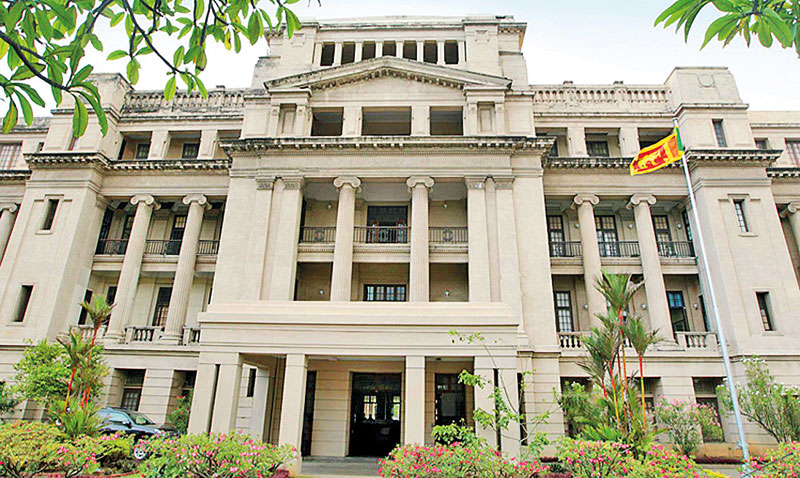Monday Mar 02, 2026
Monday Mar 02, 2026
Monday, 2 September 2024 02:21 - - {{hitsCtrl.values.hits}}

Ashwin Hemmathagama in New York
In ongoing efforts to stabilise Sri Lanka’s financial future, the Steering Committee of the Ad Hoc Group of International Bondholders has stressed the urgent need to implement the Joint Working Framework for restructuring the country’s international bonds.
With significant progress made in negotiations, the Steering Committee believes it is crucial to launch the restructuring plan by mid-September 2024 to ensure Sri Lanka’s path to sustainable growth and financial stability. The Steering Committee, moving to file an amicus curiae brief about Sri Lanka’s ongoing motion for a further stay of proceedings filed at US Southern District Court of New York in Hamilton Reserve Bank Ltd. v. Sri Lanka, tends to support the island nation through its financial crisis while safeguarding the interests of international bondholders.
Since April 2022, when Sri Lanka suspended principal and interest payments on over $ 12.5 billion of its foreign debt, the country has been working towards a comprehensive restructuring of its external debt. In March 2024, Sri Lanka began initially restricted negotiations with the Bondholder Group, and by June 2024, both parties had agreed on a Joint Working Framework.
This framework proposes significant measures, including forgiving approximately $ 4 billion of outstanding debt, deferring near-term maturities, and providing more than $ 9 billion in cash flow relief during the period covered by the International Monetary Fund (IMF) program from 2023 to 2027.
The Steering Committee emphasises that launching the restructuring by mid-September is critical. The framework is designed to align with Sri Lanka’s IMF program debt sustainability targets and provide substantial financial relief, helping the country avoid further economic instability. However, the implementation of the bond restructuring depends on formal confirmation from the IMF that the plan complies with its program’s debt sustainability requirements. Additionally, the Official Creditor Committee (OCC), representing Sri Lanka’s non-private, official creditors, must verify that the restructuring meets the comparability of treatment provisions in its agreement with Sri Lanka.
While the Steering Committee recognises ongoing discussions between Sri Lanka, the IMF, and the OCC, they highlight the necessity of prompt action. With the upcoming Presidential election in Sri Lanka scheduled for 21 September, and the looming threat of potential litigation from other bondholders, the Committee is concerned that delays could jeopardise the significant progress made so far. Therefore, it has called for a swift launch of the bond restructuring plan to consolidate these gains and move forward towards economic recovery.
The Steering Committee has not taken a definitive position on Sri Lanka’s recent motion for a further stay of proceedings, but it remains committed to collaborating closely with the Sri Lankan authorities to ensure the successful execution of the bond restructuring. The Committee’s dedication to working with Sri Lanka reflects a shared interest in fostering a stable financial environment conducive to long-term growth and stability.
As the deadline approaches, all eyes are on Sri Lanka to see if the Joint Working Framework can be launched as planned. This would mark a significant step towards resolving the country’s debt crisis and restoring economic confidence. The coming weeks will be critical in determining whether these efforts will culminate in a successful restructuring, providing much-needed relief and stability for Sri Lanka’s economy.
The Steering Committee’s decision to file an amicus curiae brief reflects its proactive approach to ensure that procedural delays or legal challenges do not hinder the debt restructuring process. By providing their expert opinion to the Court, the Committee aims to underscore the importance of promptly moving forward with the Joint Working Framework.
This submission is particularly significant in light of Sri Lanka’s Motion for a Further Stay of Proceedings, filed on 30 July 2024, which seeks to extend the current legal pause on actions against the country for an additional four months. The Steering Committee’s involvement as an amicus curiae highlights the delicate balance between legal processes and the urgent need for economic stabilisation measures. Their legal intervention serves as a reminder of the critical stakes involved and the potential consequences of further delays.
Moreover, the Steering Committee’s actions are geared towards fostering a collaborative environment where both private and official creditors can work together to support Sri Lanka’s economic recovery. The Committee’s commitment to a mid-September 2024 deadline for initiating the debt restructuring underlines their understanding of the broader economic implications of prolonged uncertainty. With Sri Lanka’s financial future hanging in the balance, the timely execution of the Joint Working Framework is not just a financial necessity but also a critical component of restoring confidence among international investors and stakeholders.
The Steering Committee’s advocacy for swift action, coupled with their readiness to engage constructively in the legal process, positions them as a crucial partner in Sri Lanka’s journey towards financial stability and sustainable growth, highlighting the need for unity in the face of crisis.
Sri Lanka was sued in the United States by a bondholder after the Government defaulted on its debt for the first time in history while struggling to stop an economic meltdown where HRB, which owns over $ 250 million in principal amount of $ 1 billion worth of Sri Lanka’s 5.875% International Sovereign Bonds (ISBs) issued in 2012, filed the lawsuit in June 2022 in a New York federal court seeking full payment of principal and interest. The Bonds matured on 25 July 2022. HRB alleged that, due to Sri Lanka’s default, it is owed $ 250.19 million in principal and $ 7.349 million in accrued interest (before accounting for pre-and post-judgement interest).
Sri Lanka in mid-April announced a moratorium on foreign debt repayments, including the Bonds, and since then has made no payments on the Bonds. The Government of Sri Lanka filed a motion in September 2022 to dismiss on the grounds that the plaintiff lacks contractual standing.